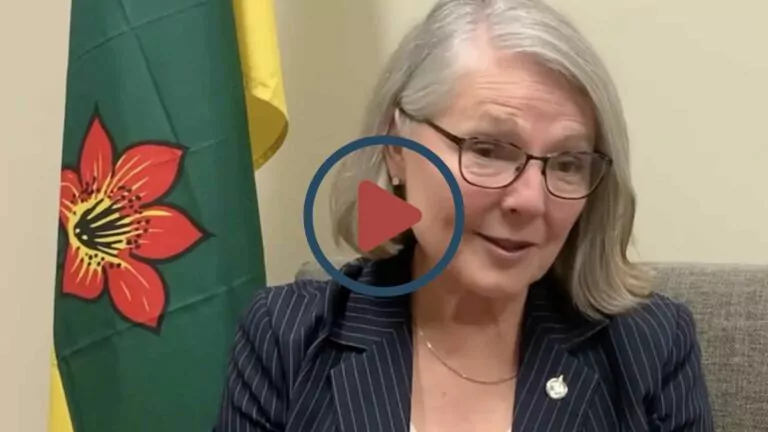TRANSCRIPT
Welcome to Reformed Perspective. I’m Alexander Ellison. Since the Morgentaler Decision in 1988 there has been no abortion law in Canada. The Supreme Court struck down the existing law, stating that it hindered equal access to abortion. However, it’s essential to note that the Court’s decision did not endorse the absence of federal legislation on abortion, or protection for pre-born children. In fact, it affirmed Parliament’s right to create new legislation. In response to the Morgentaler Decision, Brian Mulroney’s Conservative government attempted to draft a compromise abortion law in 1990. Despite efforts to balance pro-life and abortion advocate perspectives, Bill C-43, which permitted abortion only if a physician deemed it necessary for a woman’s health, passed in the House of Commons, but was later defeated in the Senate. Since then, Member of Parliament Cathay Wagantall has championed change by introducing three private member’s bills, each aimed at recognizing and upholding the inherent value of human life.
Cathay Wagantall: So, I’m Cathay Wagantall and the Member of Parliament for Yorkton-Melville which is a riding along the Manitoba border, a couple hours north of Regina, our capital. It’s 42,000 square kilometers and it’s rural and I’ve been a Member of Parliament for eight years now. The first [bill] was – we called it Cassie and Molly’s Law – protecting pregnant women and their pre-born children. An individual named Jeff from Windsor had reached out. I think at one point in time he had become friends with folks at ARPA Canada. It was actually Mike Schouten who introduced me to the possibility of doing a bill in relation to what happened to Jeff when he lost his partner Cassie who was 7 months pregnant at the time. They weren’t together anymore, but they were still in a very good relationship and had named Molly Molly and were ready to raise her together in their homes about a block apart. And [Cassie] was attacked in her home by someone who knew both of them and it was horrific. What Jeff didn’t expect, and was thoroughly blown away, was that there was no [legal] recognition of [the death of] Molly.
So Cassie and Molly’s Law was to protect pre-born children by basically bringing in a law that gave serious criminal charges for also either injuring or taking the life of a pre-born child. That bill used words like “pre-born child” which is in the Criminal Code but not in this context. And so it, of course, raised the angst of the House, well pretty well every other party, who are very very anti- pro-life legislation, and are very pro-abortion. So that’s the direction that they wanted to take this bill, which they did. But I was very fortunate that my colleagues all supported it, except for two and one abstained for various reasons. But that being said, it did wake the House up to the fact that there was someone there who was willing to bring those issues to the floor.
When I do trade shows or anything like that, I always have petitions. So I would have one on Firearms – I live in rural Saskatchewan – one on palliative care, and one on life issues. And I realized that although people want abortion to be available, they have this idea that it’s already a law in Canada and it’s minimal. So when I brought forward the next [bill] it was a sex-selection abortion bill, that basically should be illegal. And God is really good; He times things often to assist with what He’s put you there to do, and at the same time a poll came out that made it clear that in Canada Canadians are not as divided on this issue, is what it said, as honestly, the media and politicians want you to think they are. What it did is it showed that the majority of Canadians want access to abortion, but as you dug deeper with their questions they totally want a law against sex selective abortion, late term abortion, they want more pregnancy counseling centers, not less, and they want doctors to have to share with their patient exactly what the dangers and and potential complications are of this type of surgery, which is not required in Canada. I mean, I’ve had my gallbladder out; I spent half a day at the hospital being told a number of things, and that does not happen in this case.
So I brought it forward and people would come to sign my petitions and they’d go “I believe in access to abortion, I’m a nurse” or whatever, and I’d say “Oh, so you’re okay with sex-selective abortion?” and they said “No.” And then I explained the dynamics that are in Canada right now, where besides North Korea we’re the only country without any laws. And they would sign my petition. So I realized that although [my bill] was not going to pass in the House, and this is one of the challenges of this area, is that you have to win in different ways until it becomes something that can happen within our government, and because of the way the House is set up right now, the only political party that you can be a part of, that does not insist that you have to be pro-abortion is the Conservative Party. So you know you’re not going to win a vote in the House. But it’s important that we always keep these things in front of Canadians. I believe that as legislators we have a responsibility to respond to culture, but we are also responsible for shaping what our values are in Canada and this is part of that. So again, of course, the bill didn’t pass and it was very vital if you ever want to go and listen to some of the speeches it’s very clear that there’s a lot of anger, and and an attempt to make those of us that are pro-life look like terrible people. Yeah, it’s the House of Commons. But we made headway because across the country people woke up to realize that in Canada we we don’t have these laws.
As Wagantall mentions with the current political climate it’s challenging to get parties with hard stances on abortion to side with pro-life bills. A policy analyst with ARPA who has worked on these pro-life bills explains why she says they take the incremental approach:
Anna Nienhuis: Yeah, so we take an incremental approach just because of the legal reality in Canada. Right now there is no abortion law, so there is no legal protection for any pre-born children, and there’s this polarized debate that kind of pits the pro-choice and pro-life side against each other, so we work to find common ground where Canadians can agree so that we can protect some pre-born children while we work for that cultural shift to be able to protect them all.
This past spring Wagantall had the opportunity to introduce another private member’s bill.
Cathay Wagantall: I have to admit that after the third election I said, okay, Lord, I’d be okay if I didn’t have another private member’s bill, and He said no, nope, that’s not how it’s going to be, so I did get an opportunity again this last time around – number 62 or 63 – and I brought forward the violence against pregnant women act which is similar to Cassie and Molly’s law but far more targeted. It didn’t bring in any sentencing or anything like that but what it did is said that if an individual has committed this crime and that crime has been recognized by the courts and this person has been found guilty then the judge must consider that a child was also physically harmed or murdered as an aggravating factor and what that means is they absolutely must take that into account when they’re sentencing and there’s only about a handful of, circumstances where aggravating factors are required, but this is about violence against pregnant women and violence against women is a priority of this government and something that they want to champion that they’re about. And, of course, I was able to indicate that well if that’s the case then they definitely should be supporting this bill and again they took the same approach they always do, which is attack in the House of Commons. Then the Prime Minister, and a number of women Liberal Members of Parliament did a Twitter attack on me, and of course they tried to make it sound like this is all about abortion. Again, it’s a hidden attempt, all that kind of thing. And it was amazing because, right across the country, people responded to that with their comments with saying here’s the actual feedback on this bill – it’s two sentences long and it’s about women who want to have a child – and they really lit into them for taking advantage of this in the way that they did. Now, again, of course it didn’t change the vote in the House unfortunately.
They’re representing – everyone else in the House of Commons is representing – about 16% of Canadians who are on the extreme perspective of abortion at any time for any reason. So it was exciting. It was exciting. Fortunately my leader was very supportive, as was our whole caucus. So we feel like a number of other issues around [doctor-assisted suicide], and circumstances where this government is offside with Canadians because they’re not out there representing the true perspectives, they have their own ideology and their own purposes, and their own attempts to use an issue as a wedge issue, that they’re losing the ground to do that. Having a child is the most impressive thing that a human woman can do, is have those children. And there are many women who would love to have children that can’t. And we need to, at the very least, continue to push for the fact that this is something on which women are being misled. They’re being misled to think that they can’t afford or they can’t handle it. We’re women; we can handle anything. And sometimes a bad choice is made, but that doesn’t mean that you have a bad choice and you follow it up with another bad choice. So it’s important to me that we celebrate life, and the beginning of that is we’re knit together in our mothers’ wombs (Ps. 139:13) and it’s a spiritual experience and a privilege to be a mom and to have a child.
Thanks for watching this week’s episode. Please feel free to like this video and share it with family and friends. For Reformed Perspective, I’m Alexander Ellison in Ottawa.












